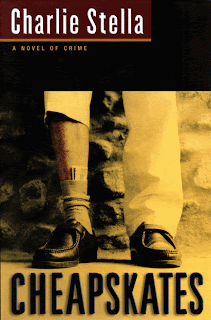
Today’s foray into the mind of Charlie Stella is his 2005 release, Cheapskates. After his reply (2 times!) to this blog, I had to get another story to confirm that his mind really is as pleasantly twisted as I thought after reading Charlie Opera. Again, we need to meet the characters and maybe you’ll get the idea of the storyline from this description. Or maybe not, and if you don’t, it’s my fault, not Stella’s.
The good guys:
Peter Rizzo-being released from Fishkill Penitentiary after serving 2 years for assault. He broke the jaw of a guy his wife was seeing. Was this an act of jealousy or did his wife set him up? His lawyer said he could get Rizzo off, but Peter wants to do the right thing and serve his time. He says his ex-wife beat him out of $50K in the ensuing divorce and he wants it back, with interest (he’s not greedy. He’ll accept bank rate). While in jail, he meets . . .
Reese Waters-former NYC bus driver also doing about 2 years for car theft. When a friend pleads for Reese to drive a car somewhere, the car turns out to be stolen and the police are watching it, catching Reese in the act and was found guilty of trying to help out a friend steal cars (some friend). While in jail, Reese saves the local Nation of Islam big gun and in doing so, Peter gets his stomach sliced open. Reese and Peter become cellmates, friends, and the Nation of Islam owes Reese a big favor. Peter wants Reese to talk to his ex about the money.
Vincent Coleman-bus driver friend of Reese from back in the day.
The 2 get released and Peter ends up being killed by a professional hit man that very day. A low life guy tries to take out Reese by shooting through a door and misses because Reese bent over to pick up a St. Jude medal given to him by . . .
Laney, a friend of Reese’s mom sort of being set up to meet and get to know Reese.
But Reese and Peter just want to do what's right. With Peter dead and Peter’s family not wanting to pay for a burial or cremation (at least until Reese comes up with some $$ to release the body), Reese takes it on himself to get the money to get his friend buried from Peter's ex.
Belzinger, Greene and DeNafria-The first 2 are detectives tracking Reese trying to figure out just what in the world is going on. The latter is on the organized crime task force, currently on leave, but helping out his ex, Belzinger.
The bad guys:
Janice Barrett-Peter’s witch of an ex. She’s an exec of some sort, planned the confrontation that lead to Peter arrest knowing how he’d react, cheats him out of money, runs around with mob guys, tries to get Reese off his high horse about a burial. She is daughter and sister to . . .
Michael and Alex Barrett-in construction and in bed with the mob to occasionally launder money.
Jimmy Valentine, aka Jimmy Wigs-consigliere to the Vignieri family and soon to be hauled in by the organized crime taskforce. Janet’s current fling, possible financier to a new business, with a flair for wearing wigs. His dialogue read to me like he was always talking with his mouth full.
Johnny Mauro-low level hood, 2-time loser, carried out the failed hit on Reese.
Tommy Burns-a pro, carried out the successful hit on Peter with a penchant for distributing pre-paid cell phones and currently driving for some car service.
All Reese wants to do is the right thing and bury his friend. But he has no money, his mom dies a day or two after his release, Laney is trying to steer him away from all the potential problems, and Peter’s ex, Janice, wants nothing to do with Reese’s request. She had Peter killed, wants Reese to disappear, keep the money, and open her own agency. But to do all this, she needs Jimmy Wigs, and other assorted mob types, to shut this whole thing down. But Reese works out a plan (with an assist from the local Nation of Islam chapter), Jimmy Wigs works out a plan, muscle from the Nation has a plan, but just when the plans are about to collide, Janice goes ballistic and starts shooting, Coleman drives a bus over the Nation thug, Jimmy implicates Janice in Peter’s death, daddy Barrett and Mauro both end up dead, Reese ends up with the money keeping only what’s needed for the burial giving the rest to Laney to divvy up amongst some churches.
Got that? Two good guys caught up in things beyond their control. Another wonderfully twisted plot from Charlie Stella. And in the book, he manages a reference to one of his other books, Jimmy Bench-Press, which I HAVE to get now. Mr. Stella and graduated from an engaging diversion into a convoluted world of innocents and the mob and jumped right up into my power rotation that includes Robert McCammon, Brad Thor, Lee Child, Brian Haig, George Pelacanos, David Hagberg, and Ken Bruen. I wonder why such inventive plotting and interesting characters flies below the radar of current readers of modern crime?
And Tommy Burns was last seen driving south through Georgia, still hawking pre-paid cell phones.
East Coast Don

















